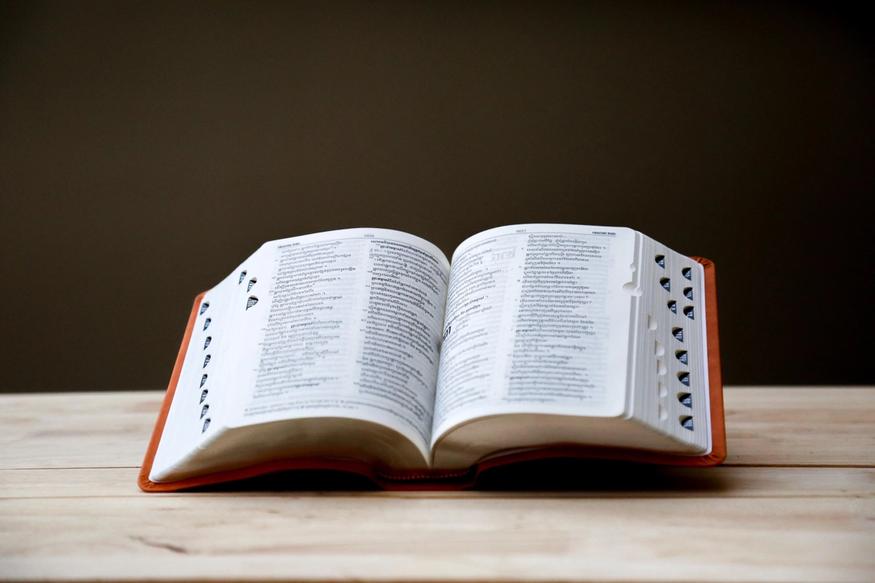Non-English Words Missing From our Mental Health Vocabulary
Published on 4/9/2020We’ve started talking about mental health, I wouldn’t say a lot, but far more than we used to. We’re often so focused on how far away we still are from our goal, of a society accepting and open to mental health struggles, that we forget to sit back and appreciate the time we were born into. I’m not saying we’re perfect, I’m not saying we should stop growing, I’m just highlighting that the term hysteria was only dropped by the American Psychiatric Association in 1952. Even after World War II, the suffragette movement and more, women were still being labelled as hysteric instead of treated for mental illness a mere 70 years ago.

One of the ways I believe we are restricted in our room for growth, the glass ceiling of mental illness if you will, is in the language we can utilise. The English language is extremely restricted compared to its counterparts.
For example, in Dutch you can differentiate between orange the colour and orange the fruit and in Tamil you have over 50 words to describe the different forms of love. I’m not saying that a sinaasappel and an oranje shirt is the cure, I’m saying that maybe our language restrictions are restricting our expression of emotion. If we were able to describe our depression, anxiety, loneliness and more in depth, we would feel heard, we would feel understood.
I’ve recently tried to avoid telling my boyfriend that I feel depressed, or anxious, also because often it doesn’t present in that neatly wrapped label. When I’m struggling with my depression, it isn’t that I feel blue (side note: Dutch only has one word for that though!). My depression can present in so many ways, and so I try to describe my symptoms, not my state of mental health. I tell him that I feel covered in prickles, like a cactus, ready to snap and be angry, or to be defensive. I tell him that I feel empty, like I am hollow inside, that I reach for my heartbeat just to know it is there. Sometimes I feel so exposed, like someone has peeled back my skin and I’m raw, and shaking like a chihuahua. Other days I feel in pain, actual physical pain, from my fingers to my toes, my whole body aches like I ran a marathon or fell down a flight of stairs. I’m starting to manage without exact words, but that took over 7 years of struggle, and a love for writing and description. Others aren’t there yet, but they could be if they had the treasure chest of vocabulary to give them the nudge.

Why should we talk about it? Might seem like an obvious question, but I don’t know a sufferer of mental illness or poor mental health who has immediately shared their struggles. Everyone will tell you it gets easier when you do, and you’ll brush them off. Just like when your parents tell you it’s easier to keep your room tidy than to do a monthly deep clean of the junkyard, or how you can focus better and feel more relaxed in a clean environment. Both true.
I think it gets easier for several reasons. Firstly, you realise you’re not alone. I was so shocked to realise how many others struggle, even though I’d constantly heard they would. You have no idea how many of your friends, family or acquaintances have had at least one rough patch in terms of mental health. People may have their own experiences with self-harm, an eating disorder, a personality disorder or something else. They could have advice or just an empathetic ear. Secondly, when you share something, the weight is shared, it becomes less heavy on your shoulders. And lastly, when you talk about doing something bad, you’re less likely to keep doing it.
Now onto the best part of this post, the words I feel should be added to the Oxford Dictionary and integrated into our vocabulary immediately. In all honesty, my list for that could take pages, I could write my own dictionary. So I will stick to my word, and focus on the ones necessary for our Mental Health Dictionary - wouldn’t that be the cutest? We could hand it out during puberty and Freshers Week.
Let’s get started.
1. Saudade (Portuguese)
Refers to a nostalgic longing or homesickness, alongside an almost paralyzing longing to be with someone in particular.
Might sound irrelevant to our Mental Health Dictionary, but it also covers a sense of nostalgia for something that hasn’t even happened, or something that will never happen again, Manuel de Melo depicted it as “a pleasure you suffer, an ailment you enjoy.” Have we never delighted slightly in our suffering? Or felt homesick for the years lost to our disease? Felt nostalgia at what could’ve been, who we could’ve been.

2. Hi Fun Kou Gai ひふんこうがい (Japanese)
This lengthy term will likely never slip into conversations naturally, but it could still be a good term to have tucked away for a rainy day. And if nothing else, discovering it is a reminder that we all can feel this way.
Hi Fun Kou Gai is a type of righteous, miserable anger, regarding a terrible situation that cannot be changed. A hopeless frustration and despair, such as watching someone you love being treated terribly or considering the corruption in the world. This struck home for me, as I have days where the idea of Global Warming, the little being done for it, and society’s disregard for this ticking time bomb makes me so angry, and so hopeless. But trying to explain to another how this is enough to have me bedridden, sobbing or punching a pillow, seems even more hopeless.
3. Weltschmerz (German)
Conveys a deep, world-weary depression and melancholy. Feeling that the world isn’t as it should be, true happiness may not be possible for us. Our physical world cannot satisfy our mind and its demands, or the sadness some feel too frequently as they are overwhelmed by the evil and suffering in this world.
Some days we’re sad not for ourselves and our depression, but for everyone else, as happy as they may seem.
4. Mono No Aware, 物の哀れ (Japanese)
A harder one to worm into our discourse, but a beautiful reflection of the particular sadness or sensitivity resulting from the passage of time and the transience of life.
Mono No Aware is stirred up through the fleeting nature of specific things and the wistful realisation that everything must end. The mournful ache of limited summer days, hiding from the sunshine as you contemplate purpose, why even try when everything will end? It can feel like we’re hamsters on a wheel, running away our limited days without a true purpose but to continue. A depression of nihilistic terms.
5. Dépit (French)
We all have those days. When every little thing is creeping under our skin. Every word, every look, every breath of another serves only to fuel our fury. We have this itching irritation that just won’t go.
It’s small scale, but sometimes those are the hardest angry feelings to convey, the irrational ones. Now when you’re having one of those irritable days and everyone is getting on your nerves, you can describe the feeling so they don’t take it too personally.
6. Lebensmüde (German)
The most literal translation of this would be “life-tired”. Take a moment to really digest that; tired of life. It conveys that deep, physical state you can enter where you have just stopped caring, stopped trying.
Some also present it through engaging in risky events, with little to no regard for their safety. Others through days they don’t leave their room, don’t wash, don’t eat. It’s almost depression fighting biology, stopping the requirements for continuing as you simply stop seeing why you should bother. Can you honestly say you’ve never stopped for a minute and thought, “why do I even try?”

7. Tante 忐忑 (Chinese)
When you tell someone you’re feeling anxious, their reaction may be to ask why, which can be difficult or impossible to describe. Tante is a state of worry, a nervousness or perpetual anxiety. Your senses are heightened, you can feel your rapid heart beat, your stomach turns in knots. It can be a way of describing anxiety without a cause, a physical anxiety, where you’re waiting for the other shoe to drop.
8. Mutterseelenallein (German)
The Germans really have their vocabulary figured out! This is a feeling that grips your entire soul, your being. It is loneliness but it is so much more than that. It is abandonment, rejection, emptiness. It translates as your mother soul having left you, and is the epitome of existential loneliness. That numbness as you lie on your bed, without the energy to even pull up the covers. You don’t even try to watch or read something, instead staring at a blank wall, mustering up the strength to pick up your phone, only to drop it when your darkness tells you that you have no one to contact, no one to help you.
9. Wintercearig (Old English)
Cheeky of me, I know, but it is a word no longer used and thus still appropriate for our list. And why not finish with giving English a small pat on the back, a “Hey, you used to have decent words for describing my emotional hell!”.
Literally, this word means “winter-care”, but it is better intended as a metaphor for the sheer strength of your sadness, depicting it to be as strong and endless as the bitter cold of mid-winter. It is a word for your darkest days, where it feels like the sun may never shine again, it is a code you could send that one friend, that small effort to reach out.

I could go on and on, and write that entire dictionary as I said. But it is harder enough finding a publisher for a half decent book, let alone a new dictionary to rival Oxford, so I’ll stop here. I hope that these words have done something for you. Whether it was a lesson in culture, a realisation that these feelings are more universal than your mental illness will allow you to believe, or has helped you find at least one word you’ll use to share your exact mood with someone.
Whether you use these words or your own, use something. Share how you feel, no matter how stupid it sounds. If it feels ridiculous, remember that I describe myself as a cactus on a weekly basis. People around you want to help, but they can only do this if you let them, and the first step is expressing exactly how your mental illness or bad mental health day is manifesting, so they know what to do. It’s the first step, a hard one, but something I can’t imagine regretting.
Featured posts

Fleur
Welcome to Symptoms of Living! A place where I like to relieve myself of the barrage of thoughts and ideas filling my mind. Here I'll take a look at various topics, from books to BPD, series to self-harm, there's nothing that we can't, and shouldn't, talk about.
Having struggled with mental illness since the age of 15, one of the hardest parts was how alone I felt in it. While mental illness is beginning to be discussed more openly, and featured in the media, I still think there is room for improvement. So whether it is mental illness or merely mental health, a bad day or a bad year, let's make this a place to approach it and strip it back. Everyone has their own symptoms of living, and you certainly won't be the only one with it.
Would you like to receive my top monthly articles right to your inbox?
For any comments/questions/enquiries, please get in touch at:
info@byfleurine.com
I'd love to hear from you!